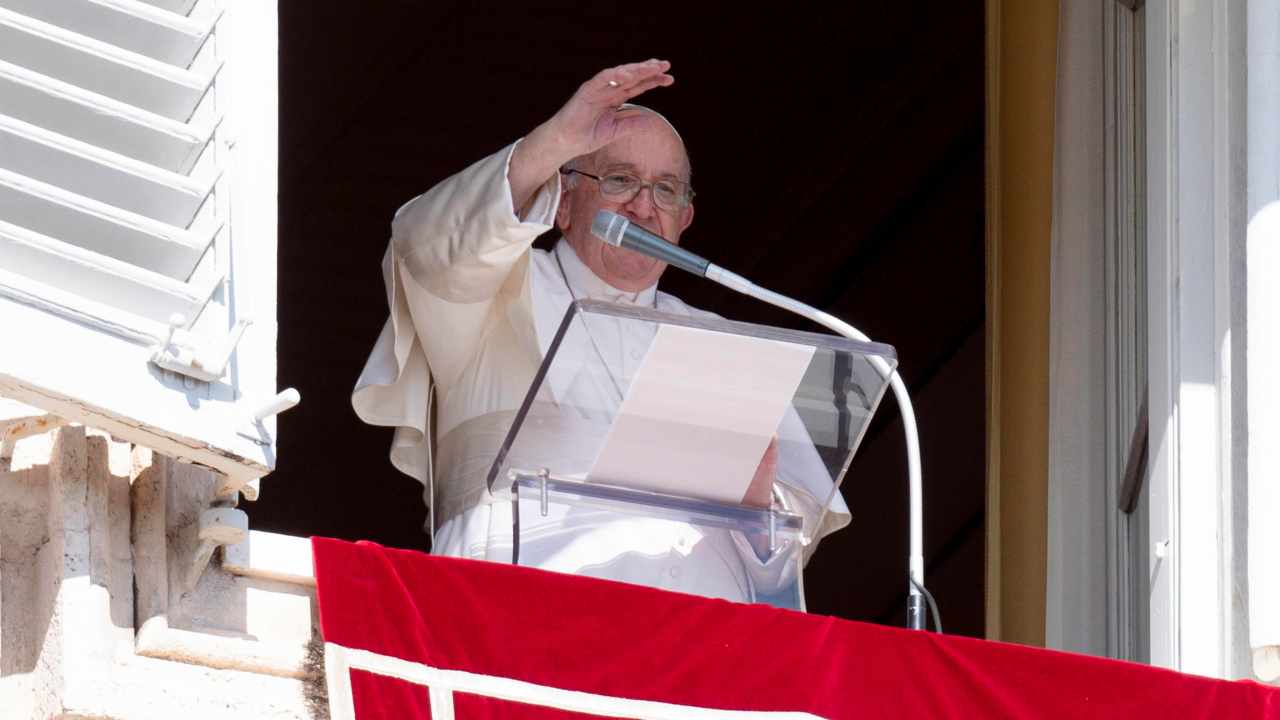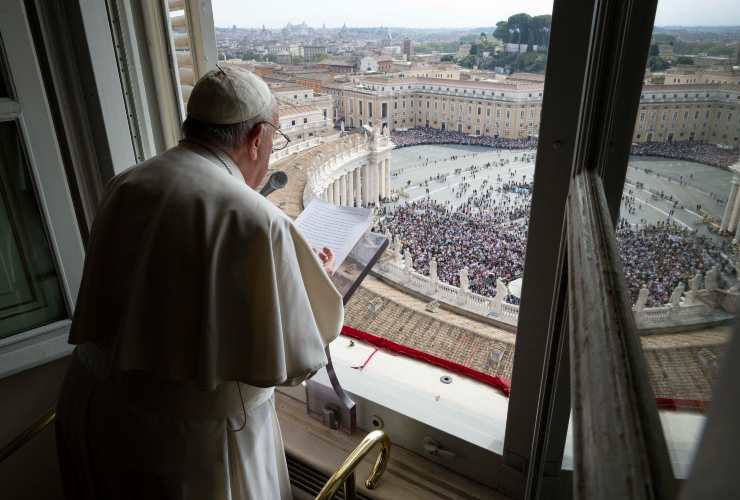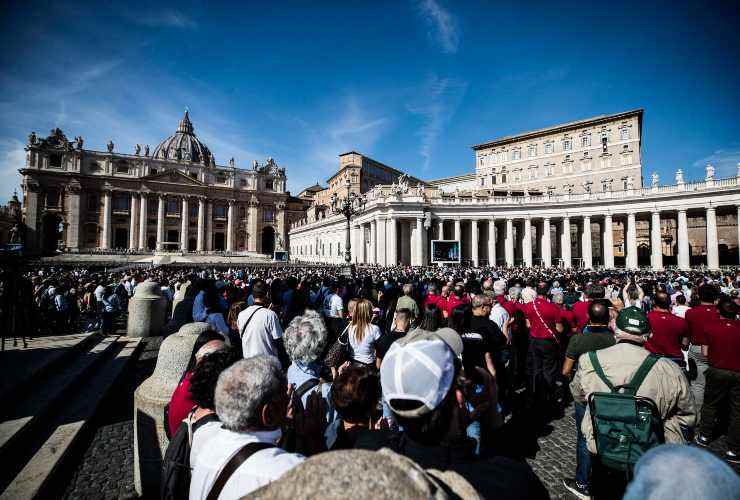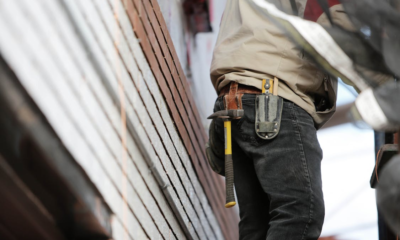Entertainment
Angelus October 30, Pope Francis reflection and prayer
Published
2 years agoon
By
Robert King
As always, on the occasion of the Sunday Angelus prayer, also on October 30, Pope Francis brings out his reflection on today’s Gospel. In this case, the Pontiff dwells on the gaze of Jesus who represents the motor of faith.
The Lord never looks down, but like the tax collector Zacchaeus, he looks down to restore dignity. This is the meaning contained in the Gospel of October 30, from which Pope Francis draws his reflection which precedes the prayer of the Angelus.
 @Ansa credits
@Ansa credits
God never looks down on us and as the Pontiff reminds us “he bent down to wash our feet”. But above all the message contained in today’s Liturgy wants to underline how the Lord never goes back on the sins that have characterized the life of each one, but is rather ready to raise them, always.
Reflection before the Angelus
The Gospel of the liturgy of this 31st Sunday in Ordinary Time recounts the meeting between Jesus and Zacchaeus, chief tax collector of the city of Jericho. This man, who had defrauded several people in the past, is eager to see Jesus, but being too small, he climbs a tree to see him. The following image, as Pope Francis explains, contains the whole meaning of faith. The Lord, in fact, stops under Zacchaeus, looks at him from below and tells him that on that day he will eat at home. The Pontiff therefore emphasizes that God never looks from above, even if we are the protagonists of a past full of errors and sins. He gazes on “the lost with compassion” and must be the gaze of Christians in the same way.
 @Ansa credits
@Ansa credits
The gaze of the Church cannot be “a gaze from above, which judges, despises and excludes”. A look that often also turns to oneself, when: “we feel insufficient and we resign ourselves, and on the contrary we do not seek the encounter with Jesus who looks with infinite confidence at what we can become”. This is the subject of Pope Francis’ reflection in Saint Peter’s Square, before reciting the Angelus. As the Holy Father wishes to emphasize, today’s Gospel restores particular value to the gaze and brings out a double interpretation which nevertheless finds its point of conjunction in the history of salvation.
The history of salvation at a glance
As Luke writes, Zacchaeus was small in stature, but perhaps the evangelist also wishes to underline the inner baseness of this man who, by collecting taxes, defrauded people. That of Zacchaeus is always a look of shame, turned downwards; however, to see Jesus, he decides to climb a tree. “He still doesn’t know him, but he’s waiting for someone to free him from his condition, to get him out of the swamp where he is. It is fundamental – explains Pope Francis in his reflection before the Angelus – Zacchaeus teaches us that, in life, all is never lost. We can always make room for the desire to start over, to start again, to retrain”. And here the second gaze becomes decisive, that of Jesus: he, sent by the Father to seek the lost, looks at the sinner from below, from the foot of the tree. “It’s a very beautiful image”, comments the Pontiff.
 @Ansa credits
@Ansa credits
“This is the story of salvation: God did not look down on us to humiliate and judge us; on the contrary, he bent down to wash our feet, looking down on us and restoring our dignity. Thus, the intersection of looks between Zacchaeus and Jesus seems to sum up the whole history of salvation: humanity with its miseries seeks redemption, but above all God with mercy seeks his creature to save it”. And here, the Holy Father recalls again that God never looks to the past, but always has infinite confidence in the future, in what each one is always capable of becoming. And it happens every time you don’t feel up to the situations, life challenges, problems. “Jesus always looks at us with love: like Zacchaeus he comes to meet us, he calls us by name and, if we welcome him, he comes to us”. And asking Christians to always look with the gaze of Jesus, the Pope concludes: “Let us remember that it is permissible to look at a person from above only to help him to rise: nothing more”.
Recent News


4 Amazing Trips for Your Family
Choosing somewhere for a family vacation that would pique the attention of adults and kids alike can be a fun...


Customising Your Makeup with Blendable Blush Options
In cosmetics, one’s face is a canvas for self-expression and creativity. Among the myriad of products available, blush is a...


The Benefits of Regular Home Maintenance
Regular home maintenance is essential for maintaining and even raising the value of your house. A proactive approach to repairs...


Understanding the Importance of SEO in Adelaide
In the digital marketplace, Adelaide businesses are in a continuous contest to gain the attention of their target audiences. With...


Breaking Down the Numbers: Understanding the Average Traveling Nurses Pay
The open road, adventure, and the chance to heal – travel nursing promises an undeniable allure. But amidst the excitement,...


Dealing with Oily Skin in Summer: Tips and Tricks
As the temperature rises, those with oily skin often face an additional challenge—maintaining a clear and balanced complexion. Excess oil...


Mountain Wedding Ideas for 2024
A mountain wedding is a stunning choice for couples who cherish nature and desire a distinctive wedding experience. Whether you...


3 Of The Best Ways To Keep Your Salon Clean
It is of the utmost importance to ensure that a salon is kept scrupulously clean, not just for the sake...


3 Reasons You Should Get Blood Tests Every Year
Regular blood tests are essential for preserving general health and identifying potential problems early on. Medical professionals can evaluate your...


How to Make Your Next Crafts Project Pop
Crafting is a creative outlet that allows individuals to express themselves through various mediums such as paper crafts, sewing, painting,...
